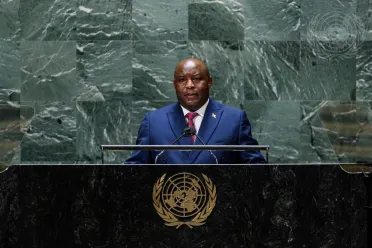Statement
Statement summary
EVARISTE NDAYISHIMIYE, President of Burundi, recalling that his country has been a United Nations Member State for 60 years, highlighted significant progress. Indeed, the only threat Burundi faces aside from COVID-19 is poverty. As such, the Government has adopted a transformative road map to expedite the socioeconomic gains that have been advancing since 2018. Fighting impunity and preventing social conflicts are priorities in its transitional justice programme. While gains have been made in fighting terrorism, he said, a common, effective strategy has yet to eradicate this scourge. Beyond military action, efforts must fight against radicalization, which preys on youth. In this vein, the United Nations must undertake a strategy to eradicate poverty, he said, expressing grave concern about terrorist activities that threaten the region and humankind as a whole. All States must pool their strengths to fight against it with greater solidarity. For its part, Burundi has made available since 2007 troops and police to United Nations and African Union operations to help countries like Somalia achieve peace.
Raising several other development issues, he said human rights must be protected through effective justice and security mechanisms. With this in mind, the international community must stand united and reject double standards. The best protection measures include strengthening national mechanisms, he said, calling on partners, including the Human Rights Council, to fairly recognize Burundi’s related efforts. In this regard, it would be counter-productive to single out Burundi, which has adopted such national measures as the independent human rights mechanism and the Truth and Reconciliation Commission. However, Burundi can only achieve development goals by improving such sectors as education and health care.
In terms of COVID-19, Burundi adopted a strategy that has kept positive test rates under 3 per cent. However, there must be a solidarity-based lasting solution for tackling the pandemic and other diseases for all nations. Burundi offers health-care services and poverty-eradication initiatives, provides free schools to all children and operates economic empowerment programmes for women and youth. Other national efforts are focusing on the return of refugees, with more than 75,000 having voluntarily returned to Burundi since July 2020.
Citing other achievements, he said the Government has adopted a plan on peace enhancement, social security and the promotion of economic growth to boost development and foster hope after Burundi’s protracted periods of conflict. Environmental protection is another action area, including financing targeted projects. Burundi’s diplomacy and cooperation plan centres on constructive engagement with other regions and countries. Appreciative that the Security Council has removed Burundi from its agenda, he said the country has returned to peace, security and stability. Highlighting regional developments, he said Burundi has joined a continent-wide free-trade agreement and, in line with the African Union’s Agenda 2063, is working on a railway project, partnering with the Democratic Republic of the Congo and the United Republic of Tanzania. Turning to United Nations reform, he commended “Our Common Agenda” as a guide forward. As Africa is the only continent without permanent Security Council seats, this historic injustice must be addressed, he said, pledging full support for the principles of the United Nations Charter.
Full statement
Read the full statement, in PDF format.
Photo

Previous sessions
Access the statements from previous sessions.
